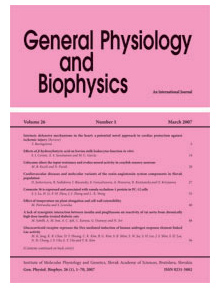Journal info
|
||
Select Journal
Journals
Bratislava Medical Journal Ekologia - Ecology Endocrine Regulations General Physiology and Biophysics 2025 2024 2023 2022 2021 2020 2019 2018 2017 2016 2015 2014 2013 2012 2011 2010 2009 2008 2007 Neoplasma Acta Virologica Studia Psychologica Cardiology Letters Psychológia a patopsych. dieťaťa Kovove Materialy-Metallic Materials Slovenská hudba 2025Webshop Cart
General Physiology and Biophysics Vol.31, No.3, p.261–270, 2012 |
||
| Title: Prolonged oxytocin treatment in rats affects intracellular signaling and induces myocardial protection against infarction | ||
| Author: Maria Ondrejcakova, Miroslav Barancik, Monika Bartekova, Tana Ravingerova, Daniela Jezova | ||
| Abstract: Oxytocin is a hormone, which is released into the circulation in response to acute or chronic stress stimuli. One of the important targets of oxytocin is cardiovascular system. Present studies were aimed at testing the hypothesis that prolonged treatment with oxytocin (simulation of stress-induced rise in circulating oxytocin) activates intracellular signaling pathways playing a role in ischemia/reperfusion injury. Furthermore, we tested protective effects of oxytocin treatment in vivo against cardiac injury induced by ischemia/reperfusion of isolated hearts. Male Wistar rats were treated with oxytocin or vehicle continuously via osmotic minipumps for 2 weeks. The hearts were used for biochemical measurements or isolated for Langendorff perfusion. Treatment with oxytocin resulted in a significant increase in specific phosphorylation (activation) of p38-MAPK and Akt kinase, an increase in phosphorylated Hsp27 and an elevation in atrial natriuretic peptide (ANP) levels in left ventricular heart tissue. There were no significant changes in the activation of MMP-2 and ERK in the left heart ventricle of oxytocin-treated rats. Postischemic recovery of functional parameters LVDP, RPP, +dP/dtmax and -dP/dtmax was better in the hearts of oxytocin-treated rats compared to that in the controls. Oxytocin treatment significantly reduced infarct size to 15.1 + 3.2% as compared to 32.4 + 3.5% in vehicle-treated rats (p < 0.01). This is the first evidence for cardioprotective effects of oxytocin administered in vivo simulating chronic stress-induced elevation in plasma oxytocin. The present results show that positive effects of oxytocin that may ameliorate negative consequences of stress on the heart are, at least in part, mediated through p38-MAPK and Akt kinase pathways. |
||
| Keywords: Oxytocin — Stress — Myocardial infarction — Protein kinases | ||
| Year: 2012, Volume: 31, Issue: 3 | Page From: 261, Page To: 270 | |
| doi:10.4149/gpb_2012_030 |
||
|
|
 download file download file |
|

